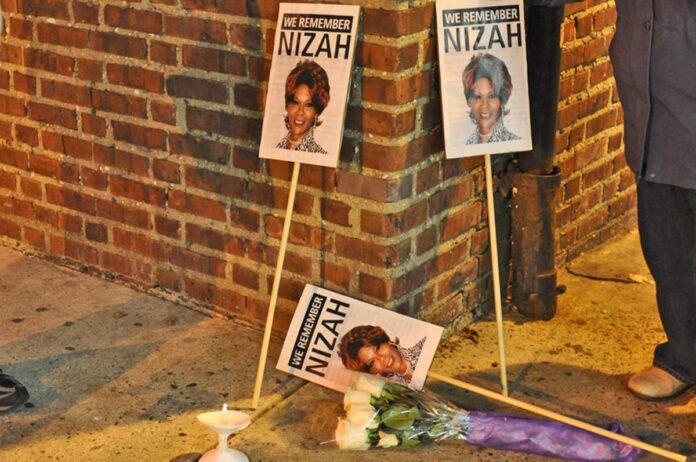Last week, attorneys for PGN subpoenaed District Attorney Larry Krasner to testify at an upcoming court hearing regarding the paper’s request for additional records in the Nizah Morris case.
As of presstime, a spokesperson for Krasner hadn’t responded to emails asking whether Krasner would comply with the subpoena.
Morris, a beloved trans advocate, was discovered with a fatal head injury during the pre-dawn hours of Dec. 22, 2002, shortly after receiving a “courtesy ride” from Philadelphia police. She died two days later and her homicide remains unsolved.
After police lost their Morris homicide file, a 2008 court order granted PGN access to a reconstituted investigative file. Various agencies including the DA’s office provided records for the investigative file, pursuant to the court order.
However, in 2011 it was disclosed that the DA’s office withheld about 30 witness interviews from placement in the investigative file. In March 2021, attorneys for PGN filed a motion in Common Pleas Court seeking access to the records.
On June 8, Judge Joshua H. Roberts granted permission for both sides to issue subpoenas. A week later, PGN issued a subpoena to Krasner, seeking his attendance at an upcoming hearing scheduled for July 19. The subpoena also requests that Krasner bring his office’s entire Morris file to the hearing.
City attorneys claim the existence of two separate Morris probes, one by police and one by the DA’s office. They say PGN is entitled to records relating to the police probe, but not the DA probe.
PGN counters that the police and DA’s office conducted a joint probe of Morris’ homicide in 2003. The paper also argues that the Morris investigative file is supposed to be comprehensive, pursuant to the 2008 court order.
At a March 31, 2021, meeting of the Liberty City LGBT Democratic Club, Krasner responded to questions from PGN publisher Mark Segal about the Morris case.
Among his comments, Krasner said: “There’s been no sign for 15+ years that a prosecution actually was going to come from [the Morris case]. At a minimum, could the family members at least know what’s happened with the investigation, for a whole variety of reasons?”
Krasner alluded to the state Criminal History Record Information Act, which limits public access to criminal records. However, Krasner went on to say: “But I believe that there are ways that we can get a very large chunk — if not all — of the Nizah Morris file turned over. That was my intent from the very beginning.”
Thus far, city attorneys haven’t asked Krasner for the additional records, though the 2008 court order requires the City Solicitor’s Office to augment the investigative file as additional records come to light.
PGN’s attorney, Andrew J. Thomson of Edelstein Law LLP, issued this statement: “At a forum with Liberty City during his Democratic primary campaign, DA Krasner said, ‘Let’s do everything we can to get you all the information… For God’s sake it’s been what, 15+ years.’ Only Mr. Kranser can define what he means by ‘everything we can.’ We subpoenaed him to bring with him the documents sought by PGN and/or explain to the Court why these need to be hidden away from the Police Investigative file and PGN. I hope Mr. Krasner has the commitment to live up to his own words. For almost twenty years, the truth is sitting in black and white in the DA’s office in these interviews. DA Krasner can shine a light on that truth anytime he wants. The hearing in July will let the Court and the public know what motivates Mr. Krasner, his predecessors, and the assistant district attorneys who advocated for this secrecy at the outset of the investigation and throughout these two decades, to keep this information hidden.”
Numerous questions surrounding Morris’ death underscore the need for a comprehensive homicide file accessible to the public.
For example, Officer Elizabeth Skala, who gave Morris the courtesy ride, testified under oath at a Police Advisory Commission hearing that she was with Morris for about 16 minutes during the incident. Skala’s estimate would place her in the presence of Morris when she suffered a head injury, according to a timeline provided by 911 recordings obtained by PGN.
Additionally, the 911 recordings raise questions about the actions of two other officers who can be heard on the tapes, Kenneth Novak and Thomas Berry. Both officers knew about the ride but turned in paperwork to supervisors obscuring its existence.
The police and DA’s office have repeatedly stated they don’t have any 911 recordings in their Morris homicide files. PGN maintains that neither agency could have a reasonable investigation of the Morris case without the 911 recordings.
